

Treatment Development: The Past 50 Years. Where have treatments for mental disorders come from?

Over the past 50 years, innovative treatments of mental disorders have emerged from research in both public (often NIH-funded) and private (pharmaceutical and biotech) sectors. In general, publicly funded research has generated knowledge about the basic biology of mental disorders, leading to the identification of treatment targets that may be explored further by the private sector. For instance, NIMH funding has been essential for identifying the serotonin transporter as a target for the development of antidepressants and dopamine receptors as targets for antipsychotic medications.
The Top 10. By Margaret Wehrenberg "I don't think I want to live if I have to go on feeling like this.
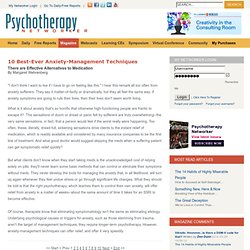
" I hear this remark all too often from anxiety sufferers. They say it matter-of-factly or dramatically, but they all feel the same way: if anxiety symptoms are going to rule their lives, then their lives don't seem worth living. Publications. Portal:Psychology. Attribution (psychology) Attribution is a concept in social psychology addressing the processes by which individuals explain the causes of behavior and events; attribution theory is an umbrella term for various models that attempt to explain those processes.[1] Psychological research into attribution began with the work of Fritz Heider in the early part of the 20th century, subsequently developed by others such as Harold Kelley and Bernard Weiner.

Heider subsequently extended his ideas to the question of how people perceive each other, and in particular how they account for each other's behavior, person perception. Motives played an important role in Heider's model: "motives, intentions, sentiments ... the core processes which manifest themselves in overt behavior". Cognitive behavioral therapy. CBT has been demonstrated to be effective for the treatment of a variety of conditions, including mood, anxiety, personality, eating, substance abuse, tic, and psychotic disorders.
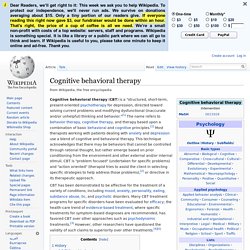
Many CBT treatment programs for specific disorders have been evaluated for efficacy; the health-care trend of evidence-based treatment, where specific treatments for symptom-based diagnoses are recommended, has favored CBT over other approaches such as psychodynamic treatments.[3] However, other researchers have questioned the validity of such claims to superiority over other treatments.[4][5] History[edit] Philosophical roots[edit] Precursors of certain fundamental aspects of CBT have been identified in various ancient philosophical traditions, particularly Stoicism.[6] For example, Aaron T.
Behavior therapy roots[edit] At the same time this of Eysenck's work, B.F. The emphasis on behavioral factors constituted the "first wave" of CBT.[15] Solution focused brief therapy. Solution focused brief therapy (SFBT)[1][2] , often referred to as simply 'solution focused therapy,' SFBT or SF therapy, is a goal directed collaborative approach to psychotherapeutic change that is conducted through direct observation of clients' responses to a series of precisely constructed questions.[3] Based upon social constructionist thinking and Wittgensteinian philosophy[3] SFBT focuses on addressing what clients want to achieve exploring the history and provenance of problem(s).[4] SF therapy sessions typically focus on the present and future, focusing on the past only to the degree necessary for communicating empathy and accurate understanding of the clients concerns[5][6] The Solution-focused brief therapy approach grew from the work of Steve de Shazer, Insoo Kim Berg, and their team at the Milwaukee Brief Family Therapy Center (BFTC) in Milwaukee, Wisconsin.
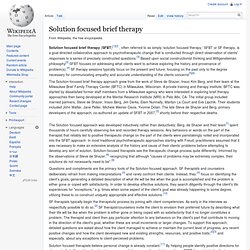
Questions and compliments are the primary tools of the Solution-focused approach. Questions[edit] Keirsey Temperament Sorter. Heading text[edit] The Keirsey Temperament Sorter (KTS) is a self-assessed personality questionnaire designed to help people better understand themselves and others.
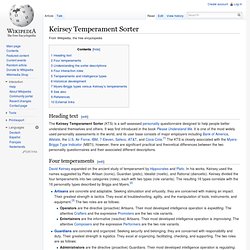
It was first introduced in the book Please Understand Me. Integrative psychotherapy. Integrative psychotherapy describes a psychotherapy approach in which elements from different schools of psychotherapy may be used.
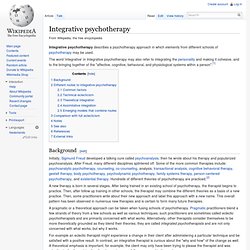
The word 'integrative' in Integrative psychotherapy may also refer to integrating the personality and making it cohesive, and to the bringing together of the "affective, cognitive, behavioral, and physiological systems within a person".[1] Background[edit] Neuroskeptic. Psychodynamics. Psychodynamics, also known as dynamic psychology, in its broadest sense, is an approach to psychology that emphasises systematic study of the psychological forces that underlie human behavior, feelings, and emotions and how they might relate to early experience.
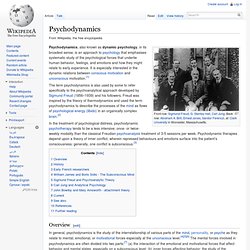
It is especially interested in the dynamic relations between conscious motivation and unconscious motivation.[1] The term psychodynamics is also used by some to refer specifically to the psychoanalytical approach developed by Sigmund Freud (1856–1939) and his followers. Freud was inspired by the theory of thermodynamics and used the term psychodynamics to describe the processes of the mind as flows of psychological energy (libido) in an organically complex brain.[2]
Mental Illness Defined as Disruption in Neural Circuits. Pulses of blue and yellow light precisely turn neurons on-and-off using genetically-targeted probes that take advantage of light-sensitive genes borrowed from primitive life-forms.
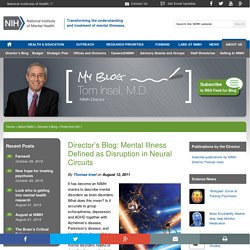
Artist’s rendering. Source: Karl Deisseroth, M.D., Ph.D., Stanford University It has become an NIMH mantra to describe mental disorders as brain disorders. Psychology... Attention Deficit Disorder - Born to Explore! ADD/ADHD Parenting Tips: Helping Children with Attention Deficit Disorder. Helping your child with ADD/ADHD: What you need to know Children with ADD/ADHD generally have deficits in executive function: the ability to think and plan ahead, organize, control impulses, and complete tasks.
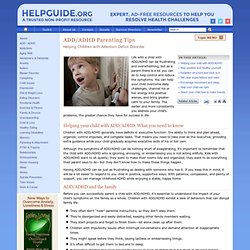
That means you need to take over as the executive, providing extra guidance while your child gradually acquires executive skills of his or her own. Although the symptoms of ADD/ADHD can be nothing short of exasperating, it’s important to remember that the child with ADD/ADHD who is ignoring, annoying, or embarrassing you is not acting willfully.